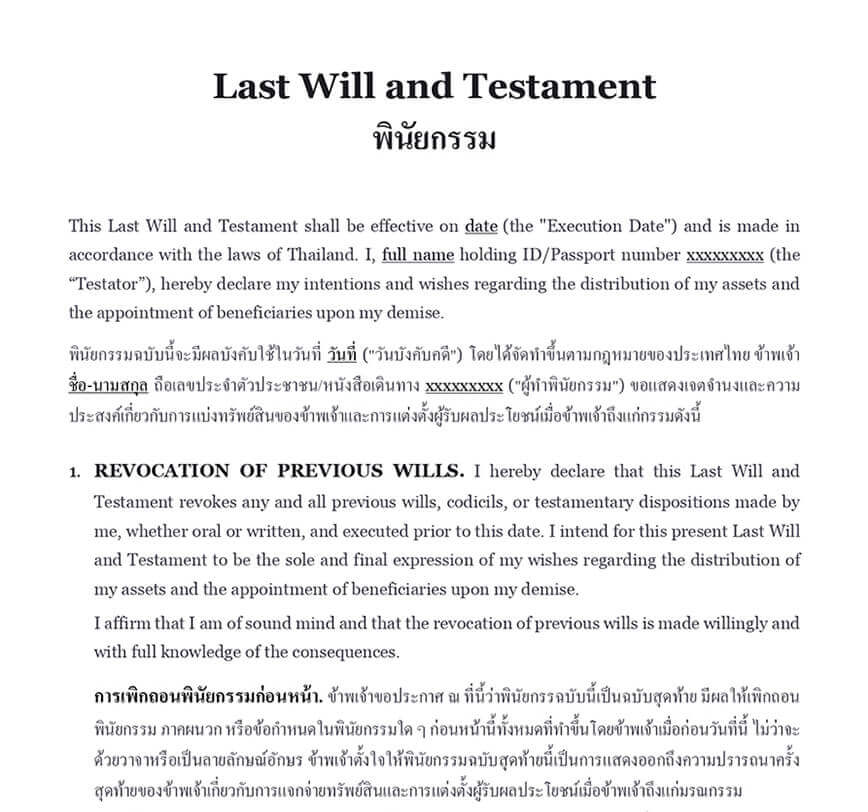Ready to use legal template
Drafted by experienced lawyers
Certified Thai-English translation
Ready to use legal template
Drafted by lawyers
Translated in Thai-English
Home › Family Law › Testament
Learn more about Last Will and Testament in Thailand
A Last Will and Testament is a crucial legal document that outlines how an individual’s assets and estate should be distributed after their passing. In Thailand, creating a well-structured Last Will and Testament is essential to ensure that your wishes are respected and your loved ones are provided for. At Themis Partner, we understand the significance of this document, and we offer a user-friendly solution – an editable legal template meticulously crafted by experienced lawyers to align with Thai legal regulations.
Table of contents
-
What is a Testament and why is it important?
-
What are the Testaments recognized in Thailand?
-
How to make a Testament valid in Thailand?
-
Can foreigners make a Testament in Thailand?
-
What does a Will and Testament include?
-
Is it necessary to register a Testament in Thailand?
-
Can a Testament be revoked or amended?
-
Can I include foreign property and assets for distribution?
What is a Testament and why is it important?
A Testament, commonly known as a Last Will and Testament, is a legally binding document that outlines an individual’s wishes for the distribution of their assets, property, and belongings after their passing. It is an essential legal instrument that allows a person (referred to as the “testator”) to specify how they want their estate to be managed and divided among their heirs or beneficiaries. In Thailand, a Testament holds significant importance for several reasons:
1. Asset Distribution: A Testament enables the testator to provide clear instructions on how their assets, including real estate, finances, personal belongings, and investments, should be distributed among family members, loved ones, or charitable organizations.
2. Control and Clarity: By creating a Testament, individuals have control over how their estate is divided, ensuring that their wishes are respected and minimizing the potential for disputes or conflicts among family members.
3. Minor Children: For parents with minor children, a Testament can designate legal guardianship and provide instructions for the care and upbringing of their children in the event of their untimely demise.
4. Complex Family Situations: In cases of blended families or unique family dynamics, a Testament can help address complex relationships and ensure fair treatment of all beneficiaries.
5. Foreign Nationals: Expatriates and foreigners residing in Thailand can use a Testament to specify how they want their Thai assets to be managed and distributed, considering both Thai and international legal considerations.
6. Unmarried Partners: A Testament can be particularly important for unmarried partners or same-sex couples who may not have legal recognition under Thai inheritance laws.
7. Business Interests: Testators with business interests can use a Testament to stipulate how their business should be managed or transferred to heirs or partners.
8. Avoid Intestacy Laws: Without a Testament, the distribution of assets will be governed by Thailand’s intestacy laws, which may not align with the testator’s wishes and could lead to unintended outcomes.
9. Efficiency and Speed: A well-structured Testament can expedite the probate process and asset distribution, providing a smoother transition of wealth to beneficiaries.
By creating a Testament in Thailand, individuals ensure that their estate is managed according to their intentions, minimize potential conflicts, and provide financial security for their loved ones.
What are the Testaments recognized in Thailand?
In Thailand, there are three main types of testaments that are recognized and governed by the Thai Civil and Commercial Code:
1. Testament by Ordinary Will
This is the most common type of testament used in Thailand. It is a written document in which the testator expresses their wishes regarding the distribution of their assets and properties after their death. The testament must be signed by the testator and at least two witnesses. The witnesses must also sign the testament, and their names and addresses must be included. The testament can be either in Thai or another language, but if it’s in another language, it must be accompanied by a Thai translation.
2. Testament by Public Will
This type of testament is made before a public official, usually a district officer or registrar. The testator declares their wishes orally, and the public official writes down the testament in the presence of two witnesses. The testament is then read aloud to the testator and witnesses, and the testator, witnesses, and official sign the document. Public wills are more formal and offer greater legal certainty.
3. Testament by Secret Document
This is a written testament that is entirely handwritten and signed by the testator. The testament must be kept in a sealed envelope and deposited with the local district officer or the registrar. Upon the testator’s death, the envelope is opened, and the contents are read aloud to the heirs and witnesses. This type of testament provides privacy and secrecy for the testator’s wishes.
It’s important to note that while these three types of testaments are recognized in Thailand, the process and requirements for each type may vary. Additionally, it’s advisable to seek legal advice and guidance when creating a testament to ensure that it is properly executed and complies with Thai law.
How to make a Testament valid in Thailand?
Creating a valid Testament in Thailand involves a series of important steps to ensure the document’s legal integrity and accuracy in representing your wishes. To begin, you must choose the type of Testament that best suits your preferences and needs. This could be an Ordinary Testament, a Public Testament, or a Secret Testament.
It’s crucial to meet certain criteria, such as age and mental capacity, to ensure that you are legally qualified to create a Testament. If you opt for a written Testament, ensure it is signed in the presence of at least two competent witnesses. For a Public Will, you’ll need to make an oral declaration of your wishes to a public official and witnesses, followed by signing the drafted document. Alternatively, if you choose a Secret Document, you’ll need to handwrite, sign, and seal the Testament, then deposit it with a district officer or registrar. Decide whether your Testament will be in Thai or another language. If it’s in another language, make sure to include a Thai translation.
While registering the Testament is not obligatory, it can provide an extra layer of protection. Store the Testament in a secure and accessible location, and inform a trusted individual, such as a family member or lawyer, about its whereabouts.
- Remarks:
It’s advisable to periodically review and update the Testament to ensure that it accurately reflects your current intentions and circumstances.
Can foreigners make a Testament in Thailand?
Yes, foreigners can make a Testament in Thailand. Thai law allows both Thai nationals and foreigners residing in Thailand to create a Last Will and Testament to specify how their assets and properties should be distributed after their passing. Foreigners who own property or assets in Thailand may find it particularly important to create a Testament to ensure that their estate is managed according to their wishes.
It’s important to note that while foreigners can create a Testament in Thailand, the process and requirements may differ from those in their home country. Therefore, it’s advisable for foreigners to seek legal guidance from professionals who are familiar with Thai inheritance laws to ensure that the Testament is properly executed and valid. This will help ensure that the Testament is legally enforceable and accurately reflects the testator’s intentions, regardless of their nationality or residency status.
What does a Will and Testament include?
A Last Will and Testament, commonly referred to as a Will, is a legal document that outlines an individual’s wishes regarding the distribution of their assets, properties, and belongings after their death. It serves as a critical tool to ensure that a person’s estate is managed and distributed according to their intended wishes. While the specific content of a Will may vary based on personal circumstances and preferences, here are the key elements typically included:
| ➤ Identification and Personal Details: The Will should start with the testator's full legal name, address, and any other relevant identification details. |
| ➤ Executor: The testator designates an executor who will be responsible for carrying out the instructions outlined in the Will. The executor ensures that assets are distributed as specified and manages the probate process. |
| ➤ Beneficiaries: The Will names the beneficiaries who will receive the testator's assets and properties. Beneficiaries can include family members, friends, organizations, charities, or other individuals. |
| ➤ Assets and Properties: A detailed list of the testator's assets, properties, investments, bank accounts, personal belongings, and any other items of value that will be distributed among the beneficiaries. |
| ➤ Distribution of Assets: The Will outlines how the assets will be distributed among the beneficiaries. This can be specified as percentages, specific items, or lump-sum amounts. |
| ➤ Guardianship: If the testator has minor children, the Will may appoint a legal guardian to care for and raise the children in the event of the testator's death. |
| ➤ Funeral and Burial Wishes: The testator can express their preferences for funeral arrangements, burial or cremation, and any specific requests related to their final arrangements. |
| ➤ Debts and Taxes: The Will may address any outstanding debts, loans, and taxes owed by the testator, as well as how these obligations should be settled from the estate. |
| ➤ Residuary Clause: This clause addresses any remaining assets or properties that are not specifically mentioned in the Will. It outlines how these residual assets should be distributed. |




